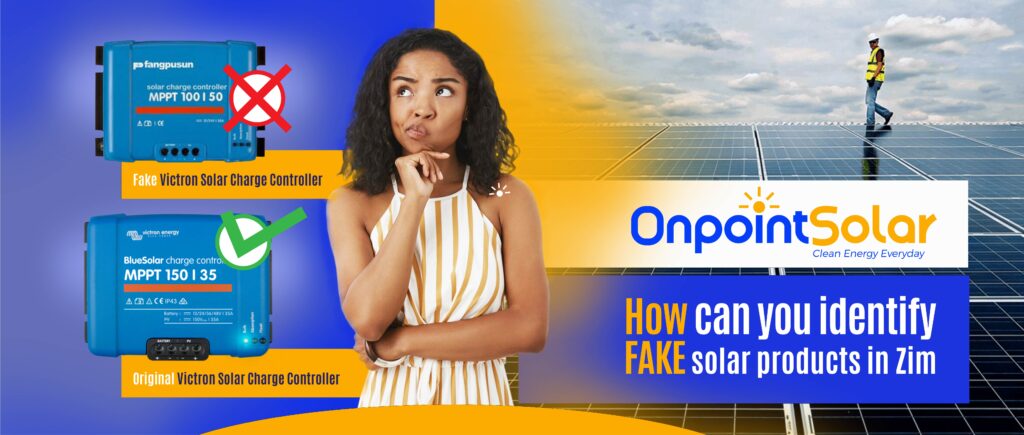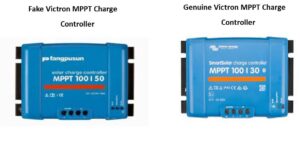OoNHow can you Identify Fake Solar Products in Zimbabwe?

In Zimbabwe’s major towns and cities, there has been a proliferation of many small shops selling solar panels , solar batteries, power inverters and other solar energy products. This mushrooming of solar players has been largely as a result of mainly, the widespread power outages being experienced in the country. Another reason is most people in the whole country are not connected to the ZESA grid, hence solar products become handy and useful to charge phones, connect home entertainment systems and more.
However, the boom in solar energy demand has created a thriving market for substandard and even fake solar products. Fake solar panels, solar inverters, solar charge controllers, bulbs and batteries have flooded the market. Many unsuspecting Zimbabweans have fallen prey to some players who have taken advantage of their customer ignorance. Also compounding this issue is most Zimbabweans cannot even differentiate between fake and genuine solar products.
What is a fake solar product?
Also called counterfeit, fraudulent or suspect item, a fake solar product is an imitation or copy of the original product. The solar equipment and products are sold under another’s brand name without the brand owner’s agreement. They may not be an exact replica of the original solar product but mimick most of its features. Therefore, the manufactures and sellers of such solar goods infringe on either the trademark, patent or copyright of the brand owner. Most genuine solar products and products have fallen and suffered from these fake solar products.
Why do some companies make fake solar products and equipment?
Fake solar products are sorely made with the intention of deceiving or tricking consumers into thinking that it is the original product. These companies want to take advantage of the popularity that some established solar brands have. They therefore want to psychologically play into the minds of customers who know the superior value of the genuine solar products. By then selling the copied product at a lower price, the customers believe they have made a bargain. These companies also know that some customers, like in Zimbabwe, are gullible and not able to differentiate between fake and genuine products.
Moreover, research and development is quite expensive. A lot goes into the development of solar products and equipment. This is wat companies that copy do not want to do. That is the reason why they just copy as it is cheap and easy.
How to Spot Fake Solar Products in Zimbabwe
How do you then know if a product is genuine or fake? When purchasing solar equipment in Zimbabwe, it is important to spot fake solar products. Knowing solar fake products can help you avoid buying low quality fakes by accident. You can identify fake solar products in the following way.
- Fake solar products are often cheap than genuine products
- Appearance is a give away
- Fake solar equipment is often of inferior quality
- Damaged spec sheets and incorrect information
- Packaging is often cheap
- Check who is selling the fake solar products
Fake Solar Products are often Cheap than Genuine Products
Whether you are shopping in downtown Harare, at Zonkizizwe Shopping Centre in Bulawayo or anywhere, prices can be one of the first indicators that the solar energy product is fake. If the price you are being given is too good to be true, then there is a high probability that the solar product is fake. Mostly originating from India, Dubai, Indonesia and China, fake solar products are priced at a fraction of genuine products to lure price sensitive shoppers. The give away price is what makes fake solar products attractive. However, due to the high demand for some solar products, fake solar products are sometimes sold at par with genuine products. This makes it hard to detect fakes.
Appearance is a Give Away
This is one of the most common ways to spot a counterfeit. Most fake solar products are have missing genuine logos, do not have serial numbers or manufacturer declaration stickers on the side. They may come in plain form without a logo or with removable logo stickers. The following shows a fake and genuine Victron MPPT charge controller. As can be seen, they are of the same color, same design and almost everything save the name and model. But it can be seen that the first one is fake.

Fake Solar Equipment is often of Inferior Quality
If you suspect that the solar product does not look genuine, then it definitely isnt. Fake solar panels for instance, come with faults in their design and have defective components. This is because they are often manufactured using seconds, which are wafers discarded by manufacturers. As such, they do not have the specified production power capacity or may not have any power production capacity at all. Some fake solar panels have also been found to have some elements which are not solar related but have just been added to increase the solar panel size. This is done to make a false impression that the module is larger. Such a practice is also done to hide the inferiority of the solar panel.
Packaging is often Cheap
Poor product packaging also may show the product is fake. Reputable solar products manufacturers often spend a lot of money in making sure the products are branded flawlessly. If the solar product is shoddily packaged, does not fit properly in its packaging or uses substandard material, product becomes suspect. Also, solar products that come without any packaging are most likely to be suspect too. Pertaining to product packaging, fake solar products are likely to feature broken safety seals or lack warranty information or producer contact details.
Wrong Information & Damaged Spec Sheets
This is also another indication that the solar products are fake. Wrong and incorrect information on the data sheets of solar panels, solar inverters, charge controllers and other solar equipment should sound alarm bells in your head. Spec sheets on solar panels contain very important information about the panel. This information includes the operational guidelines of the panel, electricity production capacity, operating efficiency and other information. If a solar panel does not have this information, then its highly likely that solar panel is fake.
Dangers of Buying Fake Solar Products in Zimbabwe
- Reduced or Zero Power Generation
- Premature System Failure
- Electrocution & Fire Hazard Risks
- Empty Warranties
Reduced or Zero Power Generation
Fake solar power products have a huge risk of reduced or zero power generation. According to ZERA top official Engineer Mataruse, some dealers in Zimbabwe were selling solar panels inscribed 300w when the solar panels generate 200w or less. Solar equipment does not generally come cheap. Solar Panels, Solar Inverters, charge controllers, solar batteries and other equipment is expensive. By buying fake solar products, customers therefore risk buying expensive solar equipment that will not serve their solar energy needs at all. This applies to the solar panels, solar inverters, solar charge controllers and batteries.
Premature System Failure
Because the solar products have not undewent manufacturer quality checks and verification, they are prone to premature system failure. Most of the products do not meet local and international quality standards and these products are susceptible to premature system failure.
Electrocution & Fire Hazard Risks
There is risk of electrocution and fire hazards if customers buy fake solar products in Zimbabwe. This means these products pose serious customer safety risks to customers. Counterfeit solar products can overheat and cause fires. Zimbabwean consumers are therefore at risk of property damage, serious injury or even death.
Empty Warranties
Solar equipment warranties cover replacement of defective or failed solar products and parts. Most reputable solar brands offer warranties on solar panels, solar inverters, batteries and other products. For solar panels, warranties are normally 25 years. However, fake solar products do not have any warranties. Customers therefore stand to lose when the solar products are faulty.
What can you do to avoid buying fake solar products?
Now that you know what fake solar products are, how you can identify them and the dangers, the next important step to know is how you can avoid buying them. Solar energy has got a lot of advantages to both individual homes and businesses. However, the proliferation of fake solar products in Zimbabwe has led to customers losing confidence in solar. This is because fake solar products bought by these customers result in reduced power generation and premature system failure. However, there is a lot one can do to avoid buying fake solar products. According to the UK based Chartered Trading Standards Institute, people should always remember the 4 Ps. These are place, price, packaging and product
- Place – Buy from reputable solar companies
- Price – If the Deal Looks Too Good, it probably is Fake
- Packaging – Poor Quality Labelling, Spelling Mistakes & Grammar
- Product – Fake Versions of Well Known Brands & Unusual Brand Names
Place – Buy from Reputable Solar Companies
The golden rule in buying solar products is to focus more on who you buy from as much as what you buy. Reputable solar companies in Zimbabwe ensure a high level of reliability and honesty. Some solar companies focus on business continuity. Therefore, these companies shall do all it takes to protect their reputation. Renowned solar companies sell quality solar equipment and products that ensure customers get value for money in the long run to get benefits of solar.

Price – If the Deal Looks Too Good, it probably is Fake
Fake solar products are normally priced lower than genuine products. Always check the advertised price against the recommended retail price of the product. What might seem like a good bargain could leave you with poor quality imitation.
Packaging – Poor Quality Labelling, Spelling Mistakes & Grammar
Before buying a solar product, you need to scrutinize the label and packaging. If you notice the packaging has something suspicious, then it could be a counterfeit solar product. Body defects, cracked or chipped solar cells, bad alignment of solar strings, abrasions on the glass, scribbled labels and bar codes on solar panels indicate fakes. Take note of spelling and grammar mistakes on the solar products. Genuine products undergo quality checks. Manufacturers of genuine solar products obviously check for these during quality checks.
Product – Fake Versions of Well Known Brands & Unusual Brand Names
Customers of solar products must also check for unusual brand names or mispelt names of well known brands.
Conclusion
Solar energy has brought a lot of benefits for individuals and businesses in Zimbabwe. The use and utilisation of solar energy brings energy independence, a reduction of high energy costs for households and businesses. However, the alternative energy source has led to the proliferation of fake solar products in Zimbabwe. From fake solar panels, inverters, solar charge controllers and solar batteries, solar consumers in Zimbabwe need to be diligent than ever before when buying solar equipment. Using fake solar products leads to loss of confidence in solar energy by consumers. Its therefore important that consumers know what fake solar products are, dangers of fake products, how to spot and avoid fake solar products in Zimbabwe.


Nice and detailed article. Really eye opening. Looking for solar products to buy in Zimbabwe and was assisted by this article. Thanks so much.
Thank you.